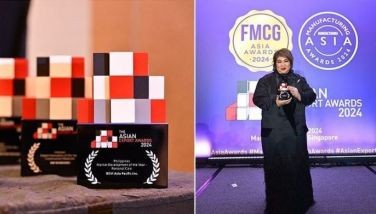Who are we?
June 26, 2001 | 12:00am
 One of the few honest bargains remaining in this country is a volume priced less than a family pizza, a novel that even department stores masquerading as a bookstore somehow carry, Sophie’s World by Jostein Gaarder. Internationally acclaimed, the work traces the intellectual and spiritual adventure of a schoolgirl across 3000 years of interactive philosophical discourse as she considers two questions someone mysteriously, provocatively, left in her mailbox, Who are you? and Where did the world come from?
One of the few honest bargains remaining in this country is a volume priced less than a family pizza, a novel that even department stores masquerading as a bookstore somehow carry, Sophie’s World by Jostein Gaarder. Internationally acclaimed, the work traces the intellectual and spiritual adventure of a schoolgirl across 3000 years of interactive philosophical discourse as she considers two questions someone mysteriously, provocatively, left in her mailbox, Who are you? and Where did the world come from?
Like Carroll’s Alice in Wonderland, Gaarder’s creation – formidably and appropriately subtitled A Novel About the History of Philosophy – may be enjoyed at several levels. It may be read by an innocent high school student as a delightful excursion in a land of fantasy where appearances reveal themselves to be amenable to innumerable, unpredictable and most unconventional transformations. At the same time, the most sophisticated philosopher or physicist could chuckle at the cleverness with which the author formulates abstruse moral and scientific propositions so a young girl could understand and intelligently, excitedly respond to them. At all levels of reading, Gaarder’s readers are sure to congratulate the author for a most edifying experience.
Amidst all the soul-searching and laments characterizing the current scene – one where some influential Filipinos deplore the apparent inability or unwillingness of our leaders and the citizenry to properly respond to what they project as make-or-break, critical times – it may not be amiss to ask ourselves Sophie’s provocative questions. Who are we, really? Truly, where did our world come from?
What are the roots of a people who appear to be unable or unwilling to demand clarity and transparency in their language, in their everyday life and in the very processes of their socioeconomic and political governance? If the historical roots are too deeply situated in the past as to make impossible an empirical demonstration of how our people got to be the way they are, is it nevertheless possible – a la Rousseau – to understand how ambiguity has become so essential to most Filipinos’ daily life? To accept that without ambiguity to shield them from powerful and extractive authorities, most Filipinos would be perilously at risk? Isn’t clarity truly the enemy of a principled but currently powerless people, those who would now imprudently openly defy arrogant tong-collectors, corrupt bureaucrats and tyrannical political leaders?
Would we be able to explain our bias for willful amnesia as regards the past and cavalier concern for the future? Why are we so obsessed with the here and the now such that our nation’s moral and religious spirituality is unable to anchor itself on bedrock foundations that endure through time? Will we ever be able to transcend the opportunism of the moment and, with the appropriate sense of responsibility for both the past and the future, act on our multiple crises in a manner that will neither dishonor our forbears nor shame our descendants?
Who are we who must continuously use survivalist and kapit-sa-patalim justifications for why we regularly act to contradict so many of our stridently professed beliefs? What kind of people are we to be so overwhelmed by the need to survive when our favored anthem marches to the unmistakable tune of happily sacrificing our lives so the nation might avoid being oppressed? When our lungs burst with patriotism, is it conceivable that no more than hot air issues from our lips?
Finally, who are we who do so much better in societies other than our own? What alchemy brings out the best in us when we are beyond our own shores and into other nation’s climes? Why are our national virtues nurtured so much better and develop so much faster in alien worlds?
Who, indeed, are we Filipinos? Are there possible answers to this question that do not require a simultaneous probe into its companion question, "Where did our world come from?" Sophie, the schoolgirl, could not find persuasive answers until a guided tour of 3000 years of philosophical inquiry allowed her to gain insights into the origins of her world. Filipinos who also would like an answer to their identity must similarly invest enough time examining their history as a people. Reading the present is important, but our own novel covers at least the last 400 years and those who meant well for this country may more carefully consider its full history to date.
Otherwise, they might mistake Filipinos for a people other than what they really are. In crisis times, we are not helped much by either uncritically romancing our people or, alternatively, needlessly deprecating them.
BrandSpace Articles
<
>
- Latest
- Trending
Trending
Latest
Latest
Recommended

December 1, 2024 - 12:32pm

November 30, 2024 - 6:30pm




























